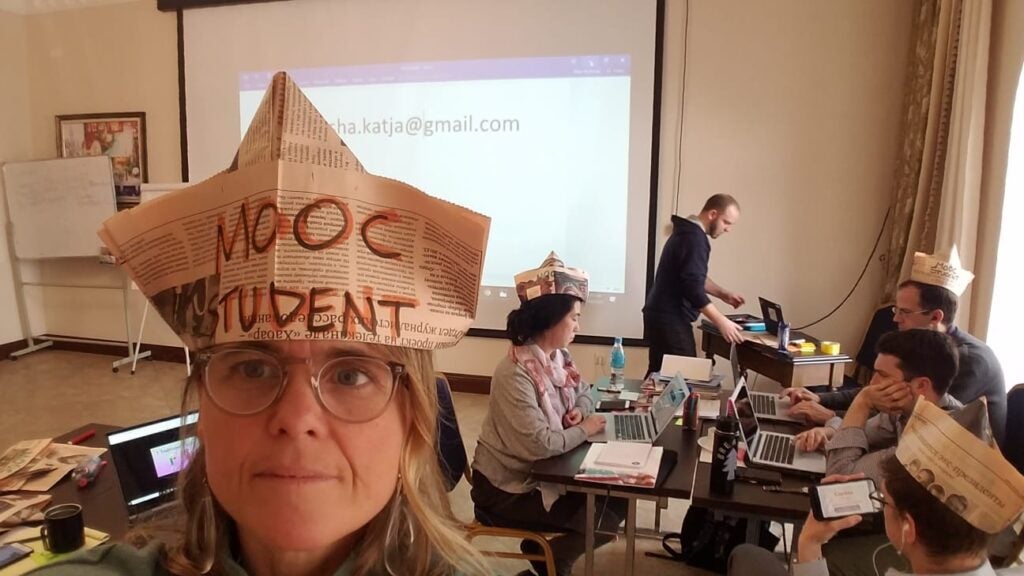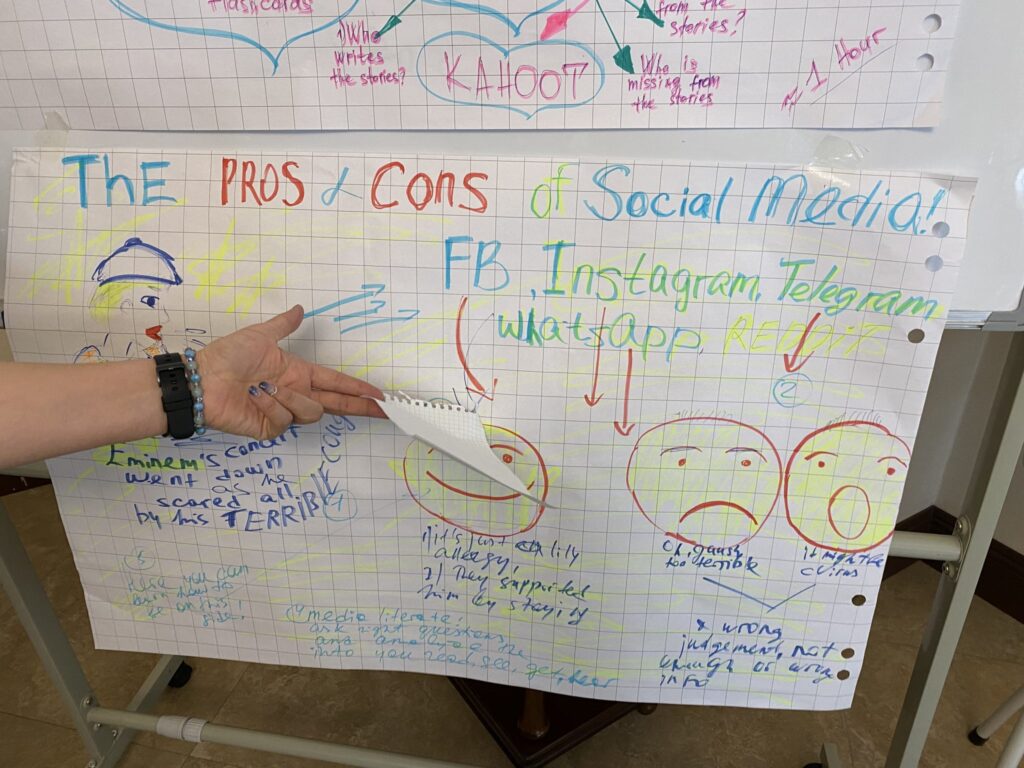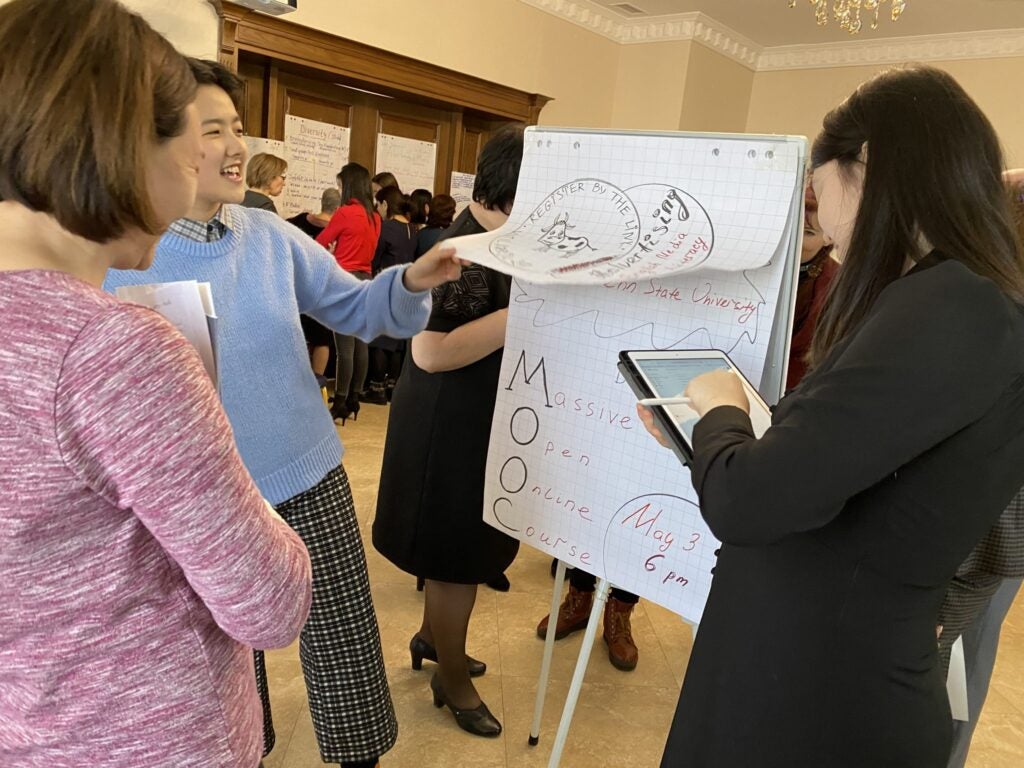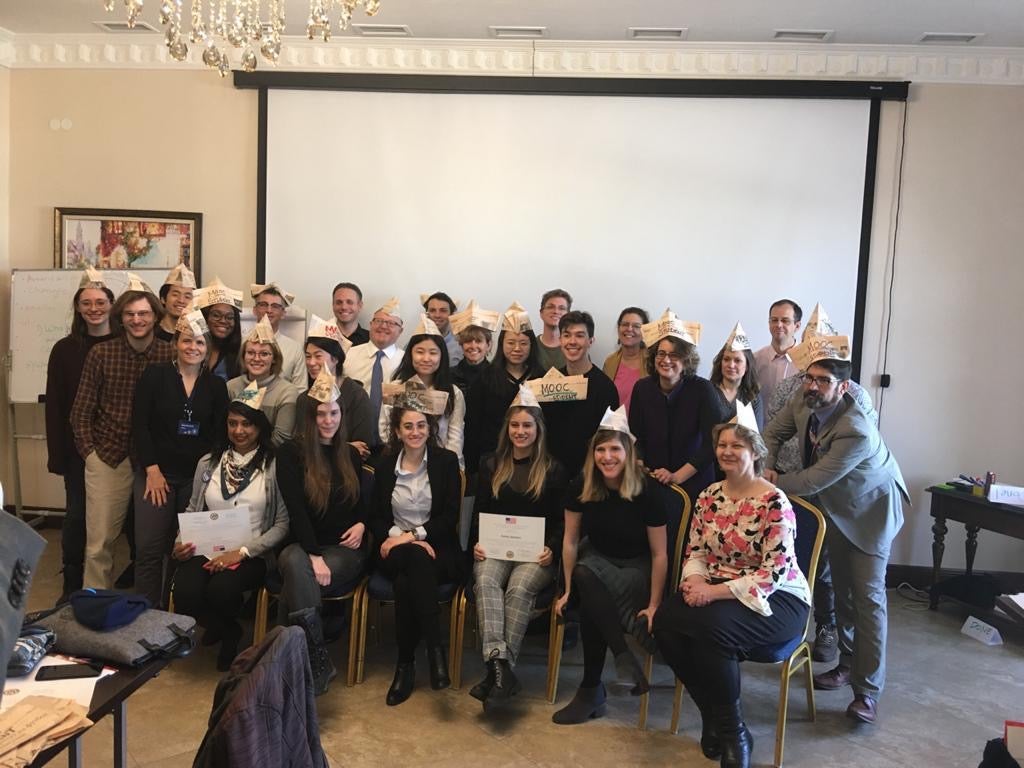In late February 2020, English Language Specialist Mary Catherine Boehmer facilitated training sessions on English for Media Literacy Massive Online Open Courses (MOOCs) in Nur-Sultan, Kazakhstan. Her project empowered a broad range of students and educators to deliver successful MOOCs, including three groups of English journalism students and high school teachers, English Access Microscholarship Program (Access) teachers, Fulbright English Teaching Assistants (ETAs) and Fulbright researchers, and Fellows posted in Central Asia. Completing this project right before the world locked down due to COVID-19 revealed new opportunities for Boehmer in her professional journey.
Empowering MOOC Facilitators and Learners from Azerbaijan to Kazakhstan

You will not find a more devoted MOOC advocate than Boehmer. “I have been called a MOOC evangelist in the past. I love MOOCs, and I have seen how they have the power to democratize education regardless of economic or existing educational status,” she shares. Boehmer developed her passion for MOOCs as a Fellow in Azerbaijan, where she created a framework for sustainable MOOC facilitation. By the end of her fellowship in 2018, she had trained a core group of Azerbaijani MOOC facilitators, and together they led 35 MOOC groups and reached more than 1,000 English learners across the country. For this Specialist project in Kazakhstan, Boehmer adapted lessons she had learned in Azerbaijan and focused her workshops on three main strategies for successful Media Literacy MOOC facilitation. She first encouraged the creation of MOOC groups, tailoring the content of one Media Literacy MOOC to the specific needs of each of the three different groups of participants she trained. She also encouraged a theme-based approach to make media literacy less intimidating to each group while supporting learners to think critically about media messages. For example, she presented a sports-themed English for Journalism course for sports journalists. Finally, she empowered MOOC participants to choose their own authentic articles instead of using texts that had been pre-selected by the creators of the original MOOC in a different context.

“An effective MOOC group is not intended to be just a repetition of the MOOC content: it’s intended to help MOOC participants engage with the content and activate knowledge. Allowing MOOC leaders or participants to select articles themselves that are more relevant or feel “safer” is important.”
While MOOCs are a useful tool to make education accessible for all, using MOOCs to help learners think critically about media messages can become a delicate task when certain topics may be off-limits. Because Boehmer had created a safe space for open discussions and exchanges, her audience felt comfortable sharing their concerns about using political materials, such as one article about propaganda. Together, they were able to find practical solutions and select their own engaging content.
Connecting Through Technology

While the tea and lunch break conversations during each training were essential for bonding with her audience and understanding their unique stories and contexts, Boehmer marvels at the lasting exchange opportunity provided by social media. It may seem trivial but by connecting with participants on Facebook and Instagram after a three-day training, Boehmer opened channels for a lifetime of professional and cultural exchange. For example, just days after the training ended, an Access teacher posted a video of himself applying a collaborative learning activity to increase his students’ participation. From thousands of miles away, Boehmer was able to provide feedback on a strategy she had shared during the training.
“I’m passionate about technology because, like English, it connects users to the world and allows them to access information and opportunities, and to build virtual communities and connections regardless of where they are.”
The timing of the project proved to be fortuitous, if for an unfortunate reason. Boehmer trained the last group of participants in the first week of March, as most countries around the world were starting to close their borders because of the COVID-19 pandemic. From one day to the next, MOOCs and online learning became increasingly prevalent, and Boehmer was able to adjust her training for the last MOOC group of Fellows, Fulbright ETAs, and Fulbright researchers. Conscious that no one knew what the future held, Boehmer focused on virtual strategies, making sure that these participants felt connected and equipped to lead virtual MOOC groups from anywhere in the world.
Experimenting and Learning Continuously

The more Boehmer uses educational technology, the more she realizes its endless potential when used effectively. Immediately after she returned home from Kazakhstan, the ESL Department Boehmer oversees at a Boston charter school moved classes online for remote learning. She was amazed by the infinite number of questions that were raised within her own teaching community, such as whether to use synchronous or asynchronous remote learning, or which tools learners can effectively navigate on their own. This pivotal moment inspired Boehmer to reflect even more on “what makes educational technology systems accessible, engaging, and successful,” she explains. In her quest to improve and expand English language programming opportunities through effective technology systems, she decided to pursue a second M.A. in Educational Technology Leadership. In addition to her new academic journey, Boehmer volunteered with the U.S. Embassy Baku to lead a small team of Azerbaijani MOOC leaders co-facilitating a virtual medical English MOOC for healthcare professionals of mixed levels of English. More recently, she has enjoyed learning how technology is used by Brazilians while doing consulting work for a Brazilian online university system. Where else will educational technology take Boehmer?

Mary Catherine Boehmer holds an M.A. in TESOL from Teachers College, Columbia University, and is currently pursuing an M.A. in Educational Technology Leadership from The George Washington University. Boehmer served as an English Language Fellow in Baku, Azerbaijan (2016-2018), and an English Language Specialist in Kazakhstan (2020). Her areas of interest include educational technology, content-based instruction, competency-based learning, and culturally responsive pedagogy, particularly in adapting educational technology to be more culturally relevant to the target culture.

